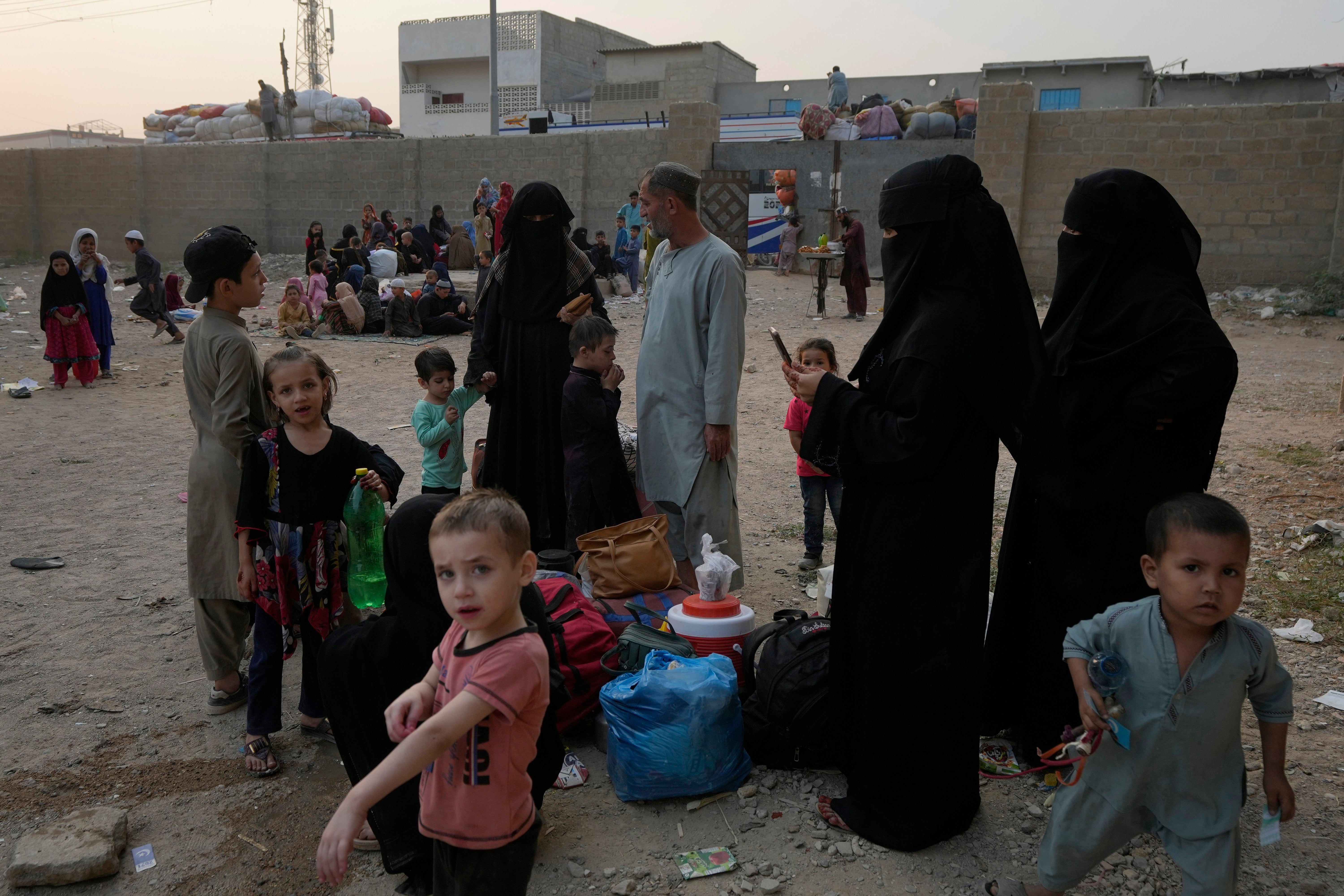Thousands of Afghans forced to return as Pakistan’s anti-migrant deadline ends
Pakistan officials say more than 100,000 Afghans have left country since crackdown

Your support helps us to tell the story
From reproductive rights to climate change to Big Tech, The Independent is on the ground when the story is developing. Whether it's investigating the financials of Elon Musk's pro-Trump PAC or producing our latest documentary, 'The A Word', which shines a light on the American women fighting for reproductive rights, we know how important it is to parse out the facts from the messaging.
At such a critical moment in US history, we need reporters on the ground. Your donation allows us to keep sending journalists to speak to both sides of the story.
The Independent is trusted by Americans across the entire political spectrum. And unlike many other quality news outlets, we choose not to lock Americans out of our reporting and analysis with paywalls. We believe quality journalism should be available to everyone, paid for by those who can afford it.
Your support makes all the difference.More than 100,000 undocumented Afghan nationals have left Pakistan and returned to Afghanistan through the northwestern Torkham border crossing as the deadline for anti-migrant crackdown looms.
These hundreds of thousands Afghan nationals travelled from across Pakistan cities to reach the border crossing, deputy commissioner Abdul Nasir Khan said on Wednesday.
The deadline imposed by Pakistan for deportation or forced removal of all undocumented immigrants, including Afghan nationals who had fled the Taliban, expired on Tuesday night.
On Wednesday, dozens of Afghans were rounded up, detained and deported after they were found to be allegedly living in Pakistan, authorities said.
“Today, we said goodbye to 64 Afghan nationals as they began their journey back home,” Pakistani interim interior minister Sarfraz Bugti said.
“This action is a testament to Pakistan’s determination to repatriate any individuals residing in the country without proper documentation.”
The crackdown took place in Pakistan’s port city of Karachi, the garrison city of Rawalpindi, and in various areas in the southwestern Baluchistan and northwestern Khyber Pakhtunkhwa provinces, which border Afghanistan, officials said.
This week saw undocumented Afghans in Pakistan rushing to the country’s border with Afghanistan.
Thousands of Afghan nationals had escaped to Pakistan in the months following the Taliban’s takeover of the country in August 2021. The Afghans had left their home country to escape the militant group’s wrath.
More than two million undocumented Afghans currently live in Pakistan, of which 600,000 had fled after the Taliban’s takeover, according to UN agencies.
Scores of the undocumented immigrants are now staring at the deadline set by the Pakistani government underits new anti-migrant crackdown.
Officials in Islamabad have said undocumented Afghans living in the country will face arrest and deportation after Wednesday.
The crackdown has left the Torkam and Chaman border crossings, in the north and west sides respectively of the countries’ shared border, open beyond their daily 4pm deadline hour to permit those who wish to leave from these points.
Pakistani officials said more than 200,000 Afghans have left the country since the crackdown was launched. The sharp surge was also confirmed by UN agencies.
The deportations will be carried out in a “phased and orderly” manner, Pakistan has claimed.
The move impacts thousands of Afghans waiting in Pakistan for international agencies to clear their asylum applications. Thousands who fled the country after August 2021 are also waiting for relocation to the US under a special refugee programme.
The rules for the US application required them to relocate to a third country to process their cases.
Several embassies of Nato members in Islamabad, along with the UN’s refugee agency, are lobbying with officials in the Pakistan government at the highest levels to seek exemption from deportation for the thousands of Afghans waiting to be resettled to Western countries.
A US diplomat, who spoke on the condition of anonymity, explained Washington’s priority was to facilitate the safe and efficient resettlement and relocation of more than 25,000 eligible Afghans in Pakistan.
“We are in the process of sending letters to those individuals that they can share with local authorities to help identify them as individuals in the US pipeline,” the diplomat said.
Pakistan’s crackdown has drawn widespread criticism from UN agencies, rights groups and the Taliban-led administration in Afghanistan.
Officials in the Western embassies and the UN have asked Pakistan for a way to identify and protect thousands of undocumented migrants to prevent them from persecution at the hands of the Taliban.
“We are asking the government to come up with a comprehensive system and... mechanism to manage and register people at immediate risk of persecution if forced to return,” said Qaiser Khan Afridi, the spokesman for the UN refugee agency in Pakistan.
“Because they cannot return, they can’t go back to Afghanistan because their freedom or their life might be at risk.”
It is not immediately clear if Pakistan has agreed to take up the proposals by the UN and other embassies.
The campaign by Pakistan comes amid strained relations between it and the Taliban rulers next door.
Islamabad accuses Kabul of turning a blind eye to Taliban-allied militants who find shelter in Afghanistan from where they go back and forth across the two countries’ shared 2,611km-long border to stage attacks in Pakistan.
The Taliban deny the accusations.
Afghanistan is also one of the most economically poor countries in the world.
It has reeled under successive severe humanitarian crises, particularly for women and girls who are banned by the Taliban from getting an education beyond the sixth grade, and from most public spaces and jobs.
There are also restrictions on media, activists, and civil society organisations.
The country under Taliban’s rule has been hit by drought and earthquakes, with millions fearing the forthcoming winter season.
Join our commenting forum
Join thought-provoking conversations, follow other Independent readers and see their replies
Comments